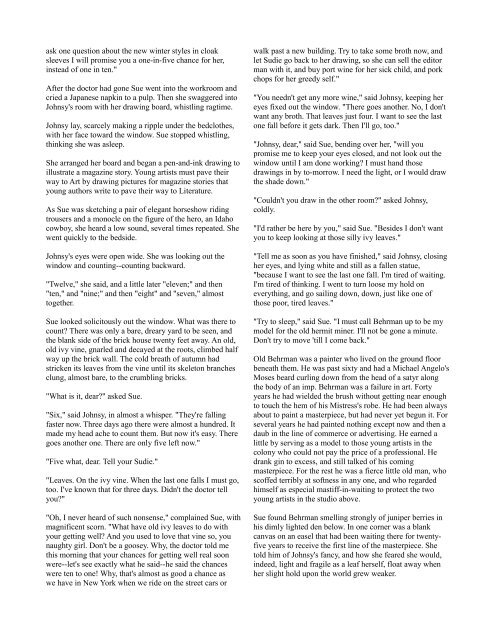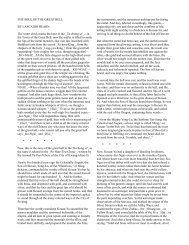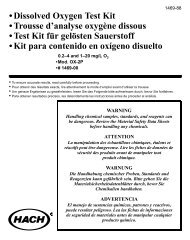AFTER TWENTY YEARS BY O. HENRY The policeman on the beat ...
AFTER TWENTY YEARS BY O. HENRY The policeman on the beat ...
AFTER TWENTY YEARS BY O. HENRY The policeman on the beat ...
Create successful ePaper yourself
Turn your PDF publications into a flip-book with our unique Google optimized e-Paper software.
ask <strong>on</strong>e questi<strong>on</strong> about <strong>the</strong> new winter styles in cloak<br />
sleeves I will promise you a <strong>on</strong>e-in-five chance for her,<br />
instead of <strong>on</strong>e in ten."<br />
After <strong>the</strong> doctor had g<strong>on</strong>e Sue went into <strong>the</strong> workroom and<br />
cried a Japanese napkin to a pulp. <str<strong>on</strong>g>The</str<strong>on</strong>g>n she swaggered into<br />
Johnsy's room with her drawing board, whistling ragtime.<br />
Johnsy lay, scarcely making a ripple under <strong>the</strong> bedclo<strong>the</strong>s,<br />
with her face toward <strong>the</strong> window. Sue stopped whistling,<br />
thinking she was asleep.<br />
She arranged her board and began a pen-and-ink drawing to<br />
illustrate a magazine story. Young artists must pave <strong>the</strong>ir<br />
way to Art by drawing pictures for magazine stories that<br />
young authors write to pave <strong>the</strong>ir way to Literature.<br />
As Sue was sketching a pair of elegant horseshow riding<br />
trousers and a m<strong>on</strong>ocle <strong>on</strong> <strong>the</strong> figure of <strong>the</strong> hero, an Idaho<br />
cowboy, she heard a low sound, several times repeated. She<br />
went quickly to <strong>the</strong> bedside.<br />
Johnsy's eyes were open wide. She was looking out <strong>the</strong><br />
window and counting--counting backward.<br />
"Twelve," she said, and a little later "eleven;" and <strong>the</strong>n<br />
"ten," and "nine;" and <strong>the</strong>n "eight" and "seven," almost<br />
toge<strong>the</strong>r.<br />
Sue looked solicitously out <strong>the</strong> window. What was <strong>the</strong>re to<br />
count? <str<strong>on</strong>g>The</str<strong>on</strong>g>re was <strong>on</strong>ly a bare, dreary yard to be seen, and<br />
<strong>the</strong> blank side of <strong>the</strong> brick house twenty feet away. An old,<br />
old ivy vine, gnarled and decayed at <strong>the</strong> roots, climbed half<br />
way up <strong>the</strong> brick wall. <str<strong>on</strong>g>The</str<strong>on</strong>g> cold breath of autumn had<br />
stricken its leaves from <strong>the</strong> vine until its skelet<strong>on</strong> branches<br />
clung, almost bare, to <strong>the</strong> crumbling bricks.<br />
"What is it, dear?" asked Sue.<br />
"Six," said Johnsy, in almost a whisper. "<str<strong>on</strong>g>The</str<strong>on</strong>g>y're falling<br />
faster now. Three days ago <strong>the</strong>re were almost a hundred. It<br />
made my head ache to count <strong>the</strong>m. But now it's easy. <str<strong>on</strong>g>The</str<strong>on</strong>g>re<br />
goes ano<strong>the</strong>r <strong>on</strong>e. <str<strong>on</strong>g>The</str<strong>on</strong>g>re are <strong>on</strong>ly five left now."<br />
"Five what, dear. Tell your Sudie."<br />
"Leaves. On <strong>the</strong> ivy vine. When <strong>the</strong> last <strong>on</strong>e falls I must go,<br />
too. I've known that for three days. Didn't <strong>the</strong> doctor tell<br />
you?"<br />
"Oh, I never heard of such n<strong>on</strong>sense," complained Sue, with<br />
magnificent scorn. "What have old ivy leaves to do with<br />
your getting well? And you used to love that vine so, you<br />
naughty girl. D<strong>on</strong>'t be a goosey. Why, <strong>the</strong> doctor told me<br />
this morning that your chances for getting well real so<strong>on</strong><br />
were--let's see exactly what he said--he said <strong>the</strong> chances<br />
were ten to <strong>on</strong>e! Why, that's almost as good a chance as<br />
we have in New York when we ride <strong>on</strong> <strong>the</strong> street cars or<br />
walk past a new building. Try to take some broth now, and<br />
let Sudie go back to her drawing, so she can sell <strong>the</strong> editor<br />
man with it, and buy port wine for her sick child, and pork<br />
chops for her greedy self."<br />
"You needn't get any more wine," said Johnsy, keeping her<br />
eyes fixed out <strong>the</strong> window. "<str<strong>on</strong>g>The</str<strong>on</strong>g>re goes ano<strong>the</strong>r. No, I d<strong>on</strong>'t<br />
want any broth. That leaves just four. I want to see <strong>the</strong> last<br />
<strong>on</strong>e fall before it gets dark. <str<strong>on</strong>g>The</str<strong>on</strong>g>n I'll go, too."<br />
"Johnsy, dear," said Sue, bending over her, "will you<br />
promise me to keep your eyes closed, and not look out <strong>the</strong><br />
window until I am d<strong>on</strong>e working? I must hand those<br />
drawings in by to-morrow. I need <strong>the</strong> light, or I would draw<br />
<strong>the</strong> shade down."<br />
"Couldn't you draw in <strong>the</strong> o<strong>the</strong>r room?" asked Johnsy,<br />
coldly.<br />
"I'd ra<strong>the</strong>r be here by you," said Sue. "Besides I d<strong>on</strong>'t want<br />
you to keep looking at those silly ivy leaves."<br />
"Tell me as so<strong>on</strong> as you have finished," said Johnsy, closing<br />
her eyes, and lying white and still as a fallen statue,<br />
"because I want to see <strong>the</strong> last <strong>on</strong>e fall. I'm tired of waiting.<br />
I'm tired of thinking. I went to turn loose my hold <strong>on</strong><br />
everything, and go sailing down, down, just like <strong>on</strong>e of<br />
those poor, tired leaves."<br />
"Try to sleep," said Sue. "I must call Behrman up to be my<br />
model for <strong>the</strong> old hermit miner. I'll not be g<strong>on</strong>e a minute.<br />
D<strong>on</strong>'t try to move 'till I come back."<br />
Old Behrman was a painter who lived <strong>on</strong> <strong>the</strong> ground floor<br />
beneath <strong>the</strong>m. He was past sixty and had a Michael Angelo's<br />
Moses beard curling down from <strong>the</strong> head of a satyr al<strong>on</strong>g<br />
<strong>the</strong> body of an imp. Behrman was a failure in art. Forty<br />
years he had wielded <strong>the</strong> brush without getting near enough<br />
to touch <strong>the</strong> hem of his Mistress's robe. He had been always<br />
about to paint a masterpiece, but had never yet begun it. For<br />
several years he had painted nothing except now and <strong>the</strong>n a<br />
daub in <strong>the</strong> line of commerce or advertising. He earned a<br />
little by serving as a model to those young artists in <strong>the</strong><br />
col<strong>on</strong>y who could not pay <strong>the</strong> price of a professi<strong>on</strong>al. He<br />
drank gin to excess, and still talked of his coming<br />
masterpiece. For <strong>the</strong> rest he was a fierce little old man, who<br />
scoffed terribly at softness in any <strong>on</strong>e, and who regarded<br />
himself as especial mastiff-in-waiting to protect <strong>the</strong> two<br />
young artists in <strong>the</strong> studio above.<br />
Sue found Behrman smelling str<strong>on</strong>gly of juniper berries in<br />
his dimly lighted den below. In <strong>on</strong>e corner was a blank<br />
canvas <strong>on</strong> an easel that had been waiting <strong>the</strong>re for twentyfive<br />
years to receive <strong>the</strong> first line of <strong>the</strong> masterpiece. She<br />
told him of Johnsy's fancy, and how she feared she would,<br />
indeed, light and fragile as a leaf herself, float away when<br />
her slight hold up<strong>on</strong> <strong>the</strong> world grew weaker.




